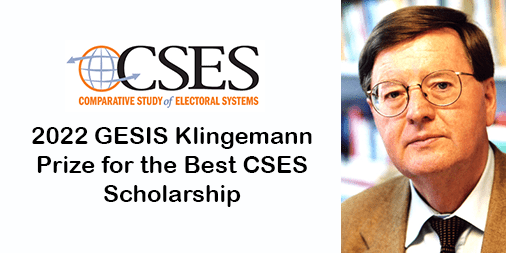Note: The following announcement was sent to the CSES email list. To receive notices like this one by email, please join our mailing list.
The Comparative Study of Electoral Systems (CSES) and the GESIS – Leibniz Institute for the Social Sciences are pleased to announce a competition for the 2022 GESIS Klingemann Prize for the Best CSES Scholarship for the best CSES scholarship (paper, book, dissertation, or other scholarly work, broadly defined) published in the calendar year prior to the award.
The prize is named in honor of Professor Doctor Hans-Dieter Klingemann, an internationally renowned political scientist, a major contributor to comparative research, and co-founder of the CSES project.
Nominations are now being accepted for the current year’s award. Nominated works must make extensive use of CSES and have a publication date in the calendar year 2021, either in print or online. Anyone is allowed to nominate or self-nominate a scholarly work for consideration by sending an email to the CSES project ([email protected]) naming the scholarly work and providing a justification for its consideration.
All persons are eligible to receive the award, except for the three persons that serve on the Selection Committee for the year. The current year’s Selection Committee is comprised of: Axel Burger of the GESIS – Leibniz Institute for the Social Sciences in Germany, Orit Kedar of the Hebrew University of Jerusalem in Israel (Chair), and Enrique Hernández of the Universitat Autònoma de Barcelona in Spain.
Nominations will be accepted until Friday, May 20, 2022. The announcement of the award winner is anticipated to be made sometime in July of 2022.
The award winner will receive a 1,000 Euros prize and be asked to present their winning work as a CSES Blog entry. The winner will also receive up to an additional 1,000 Euros toward travel, accommodation, and conference registration expenses to attend an in-person award ceremony in an upcoming year.
You may also be interested to read the CSES Blog post about the past year’s winning work, “Affective Polarization and the Salience of Elections” or to learn more about other past prize winners.
We look forward to your nominations!

